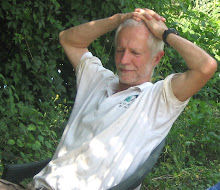
This post is written with the previous post, on
crime and punishment, in mind. There were many interesting comments which ranged from "and eye for an eye" through to education of the criminals, and then the need to understand bad behaviour with a view to preventing it in the first place.
This got me thinking. As a preamble, let me pose a question; one that exercises me from time to time. It is this: "Why do the wicked prosper?"
OK, maybe that's put a bit baldly, but in more general terms, why, when most of us are good and cooperative, do some people take advantage, hoodwink, steal, assault? Why do we find that a consistent fraction of the population are psychopathic; the real "undead" who walk among us?
[Psychopaths should not be confused with psychotics. The latter are insane, while the former lack any conscience and have a profound lack of empathy. They use other people for their own ends, and are the ones who can torture and kill without qualm. They constitute 1% or 2% of the population, and good at masking what they are.]And to answer my own question, could it be that (just as virtue does) wickedness brings its own rewards?

Let's fast forward to Hawks and Doves, a simulation first devised by the biologist John Maynard-Smith in 1973, and which is based on Game Theory. Simple though the rules are, I think it has something to tell us about social conflict.
Though the simulation is called Hawks and Doves, you can't tell from looking at the participants what they are - just as in real life a thief or a psychopath looks like you or me. The name derives from their aggressive or non-aggressive behaviour.
How does it work. Well imagine a population of Doves. Maybe a bit like the 12 disciples, but multiplied up a bit. Every now and then two of these Doves will compete over a resource, but since they won't fight the chances of either winning is 50:50, and they never have to bear the cost of injury.
Now add to this mix a mutation. We have our first Hawk, someone who is quite prepared to fight over a resource. What happens? Well, sad but true, it's a bit of a no-brainer; the bugger wins all the time, since no Dove will actually fight. Plus he never bears the cost of injury. So he is very successful.
Now what, in biological terms, does this mean? It means that he reproduces like crazy and pretty soon we see a lot more Hawks in the population. That doesn't mean they take over the world though.
As the proportion of Hawks increases so the probability of a Hawk meeting a Hawk becomes greater and greater. Now there
will be a fight. Sure, each Hawk in a Hawk-Hawk conflict will win half the time on average, just as a Dove does in a Dove-Dove conflict. However the Hawk now has a cost that no Dove has: injury.
So there you have it, all the elements for a simulation (there is one other element, posturing, which carries a cost too, but it doesn't add much to this discussion).
- the reward value of the resource
- the cost of injury
- the proportion of Hawks and Doves and how this evolves
The mathematics behind the simulation is not complicated and for given costs and rewards, which you can manipulate, the population will stabilise at a given proportion of Hawks and Doves.
What I find thought provoking about the simulation is that wickedness does not need an explanation. Or rather, the explanation is that bad behaviour exists, not because baddies are ignorant or poorly educated, but because being bad is actually quite a successful strategy. In fact, the thing that holds the proportion of baddies down is simply the cost of injury (which you could treat symbolically as a fine or time in the stocks or behind bars).
But you always find baddies. Every time the simulation is run, the outcome is the same. Turning the other cheek, is, alas, not a philosophical gesture to a baddie, it is just an injury-free reward.
Are the rules too simple to apply to real life? Perhaps. Which is not to say that there are no lessons to be learnt. And complex behaviour can spring from very simple rules as John Horton Conway showed with his now famous Game of Life.
The following may or may not be true, but they follow from the above:
- badness is not an aberration; it exists because it is a viable strategy
- like the poor, it will always be with us
- but you can lessen its incidence by increasing the cost of injury or its symbolic equivalence
 What with Christmas coming up, and trying to get bedrooms and bathrooms finished for the daughters, there has not been much time for blogging. So here is a pretty silly post.
What with Christmas coming up, and trying to get bedrooms and bathrooms finished for the daughters, there has not been much time for blogging. So here is a pretty silly post.


